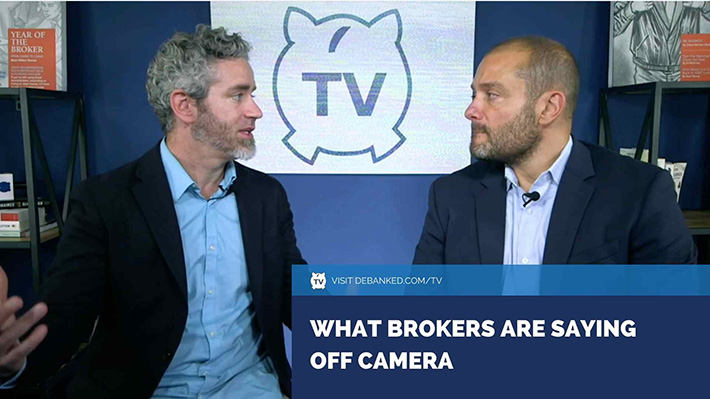


|
(CLICK HERE) |







Related Headlines
| 04/06/2024 | Are brokers endangered? |
| 03/20/2024 | Can brokers split fees in CA? |
| 11/13/2023 | Brokers sign up to Battle |
| 06/28/2023 | CA: ALL brokers to require license? |
| 02/15/2023 | In UK, biz loan brokers loaned £45bn |
Related Videos
What is a Chaser? | What is a Zero Balance Letter? |
Fundkite on Jets Field | What Brokers Are Saying Off Camera |
Stories
What We’ve Got for Brokers
April 19, 2024If you’re a small business or commercial finance broker, I hope you take advantage of the many resources we’ve put together. With the exception of tickets to our in-person events, everything we put out there is FREE TO CONSUME with no strings attached.
In addition to articles, stories, newsletters, and regular product marketing materials, we’ve produced nearly 1,000 videos including short documentaries and sit-down interviews, explainer videos, and sound bites from participants across the industry.
If you’re wondering what’s the next big thing to look out for, it’s the Broker Fair conference in New York City on May 20. There’s a big pre-show open bar party the night before as well. See you there!
Brokers: Attend This Open Bar in NYC
April 14, 2024Broker Fair’s Pre-show party sponsored by Triton Recovery Group takes place on May 19th from 7-9pm at Somewhere Nowhere NYC. The Pre-show requires a separate ticket from the main event taking place the following day at The Metropolitan Pavilion.
You can register below for one or both! OR do it on the main site at brokerfair.org.
Hundreds of Brokers Registered for deBanked CONNECT MIAMI
January 9, 2024 MIAMI BEACH – Hundreds of small business finance brokers are registered for this year’s deBanked CONNECT MIAMI. Taking place on Thursday, January 11 at the Miami Beach Convention Center, the event’s modified format includes the first-ever Broker Battle™ with a $5,000 grand prize to the winning broker, on top of an all-kosher food experience. That’s in addition to a featured presentation from David Goldin, the first-of-its-kind Broker Brilliance education session, tech demos, networking, and cocktails. Bitty Advance is the Title Sponsor.
MIAMI BEACH – Hundreds of small business finance brokers are registered for this year’s deBanked CONNECT MIAMI. Taking place on Thursday, January 11 at the Miami Beach Convention Center, the event’s modified format includes the first-ever Broker Battle™ with a $5,000 grand prize to the winning broker, on top of an all-kosher food experience. That’s in addition to a featured presentation from David Goldin, the first-of-its-kind Broker Brilliance education session, tech demos, networking, and cocktails. Bitty Advance is the Title Sponsor.
“This is our sixth event in Miami,” said conference founder and deBanked President Sean Murray. “I think kicking off a new year is as good a time as ever to reinvent yourself and change things up. I’m really excited for this show and I think 2024 is going to be a truly unique year.”
Registration opens at 1pm on Thursday and the event culminates with the Broker Battle at 5:10pm. That will lead right into the cocktail networking reception.
About deBanked CONNECT Miami
deBanked CONNECT events are operated by Foinse, LLC. Foinse, LLC is an events company based in Brooklyn, NY. To learn more visit: http://www.debankedmiami.com. For inquiries, email events@debanked.com.
Brokers: What’s Your Address and Phone Number?
December 14, 2023 Brokers, this is no joke. In eighteen days, the State of Florida will by law require that brokers disclose their actual address and phone number in advertisements that promote their services as a broker. This is because Florida’s commercial financing disclosure law added its own twist by incorporating one of DailyFunder’s original rules to its statute.
Brokers, this is no joke. In eighteen days, the State of Florida will by law require that brokers disclose their actual address and phone number in advertisements that promote their services as a broker. This is because Florida’s commercial financing disclosure law added its own twist by incorporating one of DailyFunder’s original rules to its statute.
Furthermore a broker may NOT:
(1) Assess, collect, or solicit an advance fee from a business to provide services as a broker. However, this subsection does not preclude a broker from soliciting a business to pay for, or preclude a business from paying for, actual services necessary to apply for a commercial financing transaction, including, but not limited to, a credit check or an appraisal of security, if such payment is made by check or money order payable to a party independent of the broker.
(2) Make or use any false or misleading representation or omit any material fact in the offer or sale of the services of a broker or engage, directly or indirectly, in any act that operates or would operate as fraud or deception upon any person in connection with the offer or sale of the services of a broker, notwithstanding the absence of reliance by the business.
(3) Make or use any false or deceptive representation in its business dealings.
What’s the risk of non-compliance?
The Florida Attorney General has the right to commence administrative or judicial proceedings to enforce compliance with this part.
1. A violation of this part is punishable by a fine of $500 per incident, not to exceed $20,000 for all aggregated violations, arising from the use of the transaction documentation or materials found to be in violation of this part.
2. A violation of this part after receipt of a written notice of a prior violation from the Attorney General is punishable by a fine of $1,000 per incident, not to exceed $50,000 for all aggregated violations, arising from the use of the transaction documentation or materials found to be in violation of this part.
These rules were signed into law in June of this year and they apply to all deals funded starting January 1, 2024.
10 Commandments of ACH Processing For Brokers
May 18, 2023deBanked recently spoke with Zalman Notik, the Operations Manager of MCA Track & GoACH. Notik offered up so much advice about ACH processing that it’s been codified into a helpful list! Below are his 10 Commandments of ACH Processing.
 1. Always disclose your fee. Merchants are generally okay with paying something they agreed to pay if it is disclosed.
1. Always disclose your fee. Merchants are generally okay with paying something they agreed to pay if it is disclosed.
2. Make sure that everything agreed to is in writing and plainly stated. e.g. “We’re going to debit your account for $1,000 when we get you approved for a loan.” There’s a difference between the short, long way and the long, short way. To avoid lengthy disputes, negative Google reviews, and claims of undisclosed fees, opt for the straightforward method rather than the convoluted one.
3. Remind the merchant (in writing and by phone) that you will be debiting their account on X date. As a courtesy reminder it’s probably a good idea to give that merchant a phone call saying, “Hi, John, congratulations, I got you the $100,000, we’re so excited that it worked out well and I’d like to remind you that for our agreement we’re going to debit your account tomorrow.” This can avoid a broker’s payment getting returned if in fact that merchant planned to transfer all their funds elsewhere.
4. Any change to the amount that was agreed to should come with new signed paperwork. If a broker has a piece of paper stating that they’re allowed to debit somebody’s account $10,000 and then debit them $4,000, $5,000, or $8,000, that merchant could dispute it, and they will win because they never agreed in writing to $8,000, they agreed to 10.
5. Collect a copy of the merchant’s ID and a voided check with the business name on it. Be sure that everything matches.
6. Confirm with the merchant that they own the account – Not a spouse, cousin, or friend etc. When checking state records and the business is owned by a spouse, that spouse should be signing the agreement. For example, if a couple owns Joey’s pizzeria and one of them signs the paperwork there could be a possibility that broker will receive a dispute two months later. Turns out that the other spouse is the legal signer on the bank account and now that broker is out of money. A good way to verify is through IDs or a voided check with the business name on it.
7. Communicate with your ACH provider – e.g., “The merchant said the payment will not clear etc.” No one likes surprises. Communication with the ACH provider makes them feel comfortable about working with that broker again in the future.
8. Store paperwork in a secure location so that if there is a dispute you can provide everything to the ACH processor in a timely fashion. NACHA Operating Rules & Guidelines are enforced by the government for every ACH payment. If a broker debits an account, and that merchant disputes the transaction over a period, that broker will need to provide paperwork to prove those disputes. Keep those files in a Dropbox or Google Drive account or somewhere safe and accessible.
9. Keep funds in your bank account to cover fees and returns. Having $0 in your account is a bad fit so be disciplined in keeping money in one’s account.
10. Don’t be an A*$%#%$ – if you treat your merchants well and communicate with them, you won’t find yourself fending off disputes etc. Despite what someone may sign, if the merchant feels they have been mistreated throughout the process it’s not going to stick, potentially leaving that broker with problems.
How Many Funders and Brokers Are There?
May 17, 2023 According to the State of Virginia, there are only 115 total sales-based financing providers lawfully registered to transact with merchants in the state. That includes all funders and brokers combined. The figure seems… low, although there are potential exceptions to the rule.
According to the State of Virginia, there are only 115 total sales-based financing providers lawfully registered to transact with merchants in the state. That includes all funders and brokers combined. The figure seems… low, although there are potential exceptions to the rule.
All MCA funders AND BROKERS were required to register with the state in accordance with the law before November 1, 2022. The initial registration fee is $1,000 and the annual fee is $500, but more importantly applicants must disclose any judgment, Memorandums of Understanding, cease & desist orders, or convictions resulting from a crime or an act of fraud, breach of trust, or money laundering “with respect to that person or any officer, director, manager, operator, or individual who otherwise controls the operations of such provider or broker.”
An automatically updated live list of registered providers can be viewed here.
Working With Multiple Brokers for a Business Loan? Here’s What to Talk About With Them
March 15, 2023 If you decide to engage with multiple brokers at once to try and secure the best possible business loan terms, here are some tips to ensure that happens:
If you decide to engage with multiple brokers at once to try and secure the best possible business loan terms, here are some tips to ensure that happens:
1. Request a clear breakdown of loan terms and fees: You should ask each broker to provide a comprehensive breakdown of the loan terms, including interest rates, repayment schedules, and any associated fees (such as origination fees, late payment fees, or prepayment penalties).
2. Emphasize the importance of transparency: You should stress that you value transparency in the lending process and expect full disclosure of all fees, terms, and conditions. This will help you make a well-informed decision and avoid any hidden costs or unfavorable terms.
3. Ask about their lender network: You should inquire about the range of lenders they work with and their expertise in securing loans for small businesses in you specific industry. This will give you a better understanding of their ability to find the most suitable lender for you needs.
4. Mention that you are considering multiple brokers: By telling each broker that you are speaking with other brokers, you are creating a competitive environment. This may encourage them to offer more favorable loan terms in order to secure you business.
5. Discuss you business strengths: You should highlight you business’s strong points, such as a solid credit history, steady cash flow, or a well-developed business plan. This will help demonstrate to the brokers that you are a low-risk borrower, which could potentially lead to better loan terms.
6. Ask for references or testimonials: You should request references or testimonials from other small business owners who have worked with the broker in the past. This will give you an idea of their level of customer satisfaction and the quality of loan terms they have been able to secure for other clients.
Brokers, Funders Find Their Footing and It’s Back to Business
April 12, 2022 For Mike Brooks, CEO of Best Connect Capital, the deal making never stops. A former boxing trainer turned funder said that there are no days off. “I’m always funding, I am always, always funding,” he said.
For Mike Brooks, CEO of Best Connect Capital, the deal making never stops. A former boxing trainer turned funder said that there are no days off. “I’m always funding, I am always, always funding,” he said.
Recently, Brooks has taken an interest in text message marketing. “I’ve had trouble finding somebody in text marketing,” he said. I was going on the internet and using word of mouth, and I wasn’t really able to connect with anybody. I hooked up with this company [in Miami], and it worked out really well. I already funded a couple of deals.”
Around the industry, brokers and funders have found their footing after Covid. A recent mass gathering in Miami definitely helped push things along. “The second I got off the plane in Miami this year, I saw an old friend, a business associate,” said Brooks. “That was a great connect right there.”
Nicholas Saccone, Senior Funding Advisor at Proto Financial had a similar experience. “Having the opportunity to meet up with some of our partners face-to-face [is] a really cool experience,” said Saccone. “Sometimes it is hard to find time to build relationships with all of our schedules. [Through networking] I’m able to get different perspectives on where the industry is headed and where we are now.”
“Small business lending is on the up and up,” said Frankie DiAntonio, CEO of Lexington Capital, who also ventured down to Miami with his team from Long Island. “With inflation going up, we’re finding that small businesses are outsourcing their need of funding outside the government, and there are companies like us that can come in and take care of them.”
DiAntonio spoke about how important it is to sell legitimacy to both his lenders and staff. “We’re the new kids on the block, we’re a newer company,” he said. Despite the head start his competitors may have, DiAntonio said that old school sales mentalities combined with modern marketing strategies have recently helped his company consistently fund deals and build a book of business.
“We bring in a lot of Google click ads which brings us a lot of leads, but obviously our guys just make phone calls throughout the day, as much as humanly possible,” DiAntonio said. “My guys know what they’re doing, they know the industry, they’re really good on the phones, and they know how to take care of customers.”
CRM For ISO’s and Brokers... your all-in-one crm for iso’s and brokers is here. access everything on one platform with unlimited seats.https://mcasimplified.com/home862778?a... |
Looking for 5 Brokers to Beta Test.......... looking for 5 brokers to beta test the newest crm “canyonconnect” connecting you to lenders with the highest payouts…. first 5 to j... |

See Post... brokers. the only exceptions seem to be the big guys such as rapid/kapitus, etc., , dm me... |
See Post... brokers out there to get quality leads and help them funded deals. , and about your point to work with a direct funder and be a broker, it's not actually about being good or bad , it's just not the business model we are looking at this moment as we are providing our service from outside of usa.so, it's technically not possible to become a iso or broker and we will never send any kind of unfunded/dnq and difficult to work with merchants. we use ucc and targeted data also.we purchase the data and set the campaign according to client's demand and requirements .... |
See Post... brokers face and try to avoid such issues(poor communication, deals being killed for miniscule reasons, etc). i took an interest in underwriting and deal structures which ended up in me getting into underwriting and underwriting for some of the most reputable companies in the space either as servicer(including for some of the companies on your list) or directly, and have made a name for myself amongst underwriters and investors in this industry due... |



































